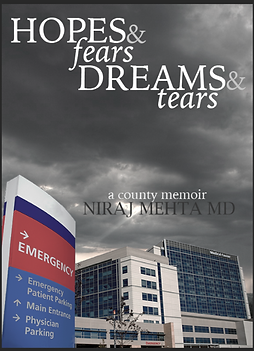
Q & A with Dr. Niraj Mehta
Author of Hopes & Fears, Dreams & Tears
Why did you write this book?
I wrote this book to share a personal journey with others reflecting on the adage that although our paths in life may be different, our destination is the same. It is not a book purely about medical training nor is it only for medical personnel. It is a book about human relationships and how powerful stories of different life experiences can bring everyone together. I wanted others to know that in this roller coaster of life, no one needs to ride alone.
Tell us a little about your book.
I have been fortunate to have had a unique perspective related to my medical education and subsequent professional career in that I have worn a different label at the same institution, the county hospital in Houston. The journey started as a medical student in 1989, continued as a resident from 1993-1996, and reached its “pinnacle of success” as a faculty member since 1996. Having come full circle and with continued interactions with learners who are now wearing my former label, I came to realize that perhaps the most important lessons of my education started as a medical student when I was considered to be the least valued member of the team. As a student, I took care of a person, not knowing much about the disease. Somehow chasing a greater call to glory, I forgot about the patient and in time became a successful yet lonely doctor who was just treating a disease. Using humor to reflect on personal triumphs and tragedies, the book will hopefully remind learners that we are here to heal patients and perhaps in embarking on such a task will end up healing ourselves.
Why did you name it Hopes and Fears, Dreams and Tears: A County Memoir?
The concept of a county memoir is self-explanatory since the book is my personal journey at a county hospital. During my training and beyond, I met so many people at the county hospital that were different in every imaginable way possible including creed, color, social, economic, political, religious, cultural, and educational background. And yet, like pieces of a jigsaw puzzle, we all connected. The common theme was that as human beings, rich or poor, educated or not, happy or sad, all of us have the same Hopes and Fears, Dreams and Tears.
What inspired you to write your memoir? Why did you have to share your story?
My inspiration has been every single interaction that I have had at the county hospital for the past 25 years. Some of these have involved students, residents, patients, nurses and colleagues. Others have involved janitors, cooks, radiology and EKG technicians, patient transport teams and volunteers, dietary and county store clerks, policemen and security personnel. Each interaction has been unique in that somehow lives of others became my own, some for a transient moment and others for a lifetime. I wanted to share my story not because it is unique, but because I wanted to remind others what we all know subconsciously, but have taken for granted; we belong to each other and love is the religion that binds us together.
You're writing about some very emotional times in your life. It's clear that you didn't hold anything back. What were the most difficult things to write about and why?
The wealth of a soul is measured by what it feels and its poverty is judged by what it does not. As such, it was difficult to write about the emotional periods of my journey when it felt as if I was a square peg surrounded by round holes. There were times during my training that I would cry, but there was no one there to wipe my tears. During my academic career, I wanted to have some difficult conversations with leadership, but didn't appreciate the difference between intention and perception. I wanted to convey my message about love, relationships, communication, and respect without sounding bitter. By writing about repressed memories with scars that had lingered for so long, I learned that I was a patient and a doctor, a teacher and a student, and most importantly, perfectly imperfect, just like the rest of the world. The county hospital had changed me for the better and the book reminded me once again that it is okay to be a square peg.
What do you hope readers will take away from your work?
I would hope that the book will encourage conversations related to the culture of "put up and shut up" in medical school, residency, and academia. Although academicians would suggest that we are making progress, most medical students and residents-in-training would suggest that there is still a long way to go. I would also hope that since almost all of us will see a doctor at some point in our life, that the reader will understand that doctors are humans who sometimes become "comfortably numb" just to survive and would benefit from a hug just like the rest of mankind.
How long did it take you to write the book?
The stories have been playing in my mind for over 20 years, but the writing process to completion took approximately two years and an incredible amount of patience and support from my family.
Is there anything else you'd like readers to know about the book?
I would like for the reader to remember two important quotes related to the theme of the book. The first is "To the world you may be one person, but to one person, you may be the world." The second is "We are not all born to great things, but we can all do little things with great love."